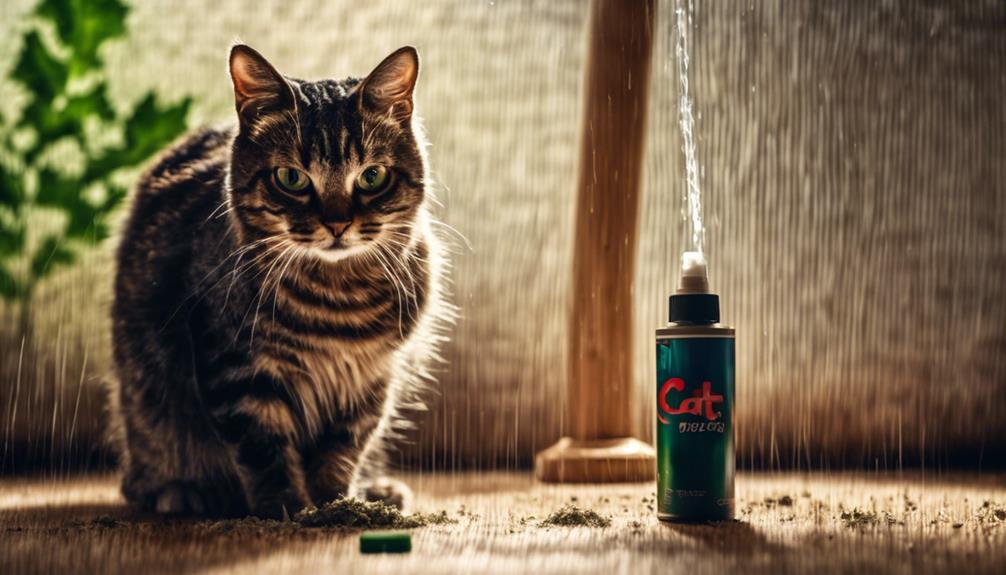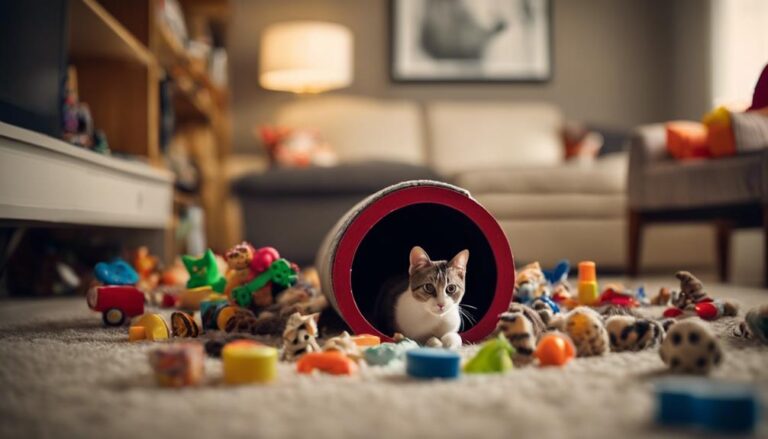If you've ever experienced the frustration of dealing with a cat who is spraying in your home, you're not alone. Understanding why cats spray and how to effectively deter this behavior is crucial for a harmonious living environment. By exploring proven solutions and deterrents tailored to address marking cats, you can take proactive steps towards creating a more peaceful coexistence with your feline companion. Stay tuned to uncover practical strategies that can help you tackle this common issue and restore balance in your home.
Root Causes of Cat Spraying
If you have ever wondered why your cat sprays, understanding the root causes is crucial for addressing this behavior effectively. Cats spray urine as a way of marking their territory. This marking behavior is a natural instinct, with intact males being more prone to spraying due to mating urges. By using urine to mark their territory, cats communicate with other animals about their presence and establish boundaries.
Territorial marking serves as a form of communication for cats. It helps them navigate their environment and assert ownership over their space. However, even neutered cats can engage in spraying when stressed or anxious. Changes in their environment or conflicts with other pets can trigger indoor marking behaviors. Additionally, medical issues like urinary tract infections can also lead to cat spraying.
Identifying the reasons behind your cat's spraying is essential for finding suitable solutions. By addressing the root causes, such as territorial instincts, stress, or underlying health issues, you can effectively curb this behavior and create a harmonious living environment for both you and your feline companion.
Understanding Cat Behavior
To effectively address cat spraying issues, you must understand their marking instinct, how they communicate through territorial scents, and the triggers that lead to spraying behavior.
By recognizing these aspects of cat behavior, you can implement targeted solutions and deterrents to prevent or minimize spraying in your home.
Taking the time to comprehend your cat's actions will help you create a harmonious environment for both your feline friend and yourself.
Cat Marking Instinct
Understanding the cat marking instinct is essential for comprehending your feline companion's behavior and communication methods. Cats have a natural urge to mark their territory boundaries, which is a normal behavior in the feline world. Here are some key points to help you grasp this instinct better:
- Cats have a natural marking instinct to communicate with other animals.
- Marking behavior helps cats establish territory boundaries.
- Cats use scent glands to leave chemical messages through urine marking.
- Understanding cat behavior is crucial in addressing spraying issues.
- Marking behavior is a normal part of feline communication and social structure.
Territorial Scent Communication
Cats utilize territorial scent communication as a natural way to mark their territory and interact with other felines. Through territorial marking, cats establish boundaries and convey information to other cats using sprayed urine. This behavior is essential for cats to communicate their presence, status, and boundaries effectively.
When a cat sprays urine, it releases chemical messages that can be deciphered by other cats, aiding in social interactions and territorial disputes. Understanding this territorial behavior is crucial in comprehending why cats engage in spraying behavior.
Behavioral Triggers for Spraying
When addressing cat spraying behavior, consider the various behavioral triggers that can lead to this territorial marking. Cats may spray due to mating behavior, stress, or territorial marking instincts. Here are some key triggers to be aware of:
- Mating Behavior: Intact male cats spray the most to attract mates.
- Territorial Marking: Cats use spraying to establish and maintain their territory.
- Stress: Neutered cats may spray in response to stress triggers like conflicts or changes in routine.
- Anxiety: Cats experiencing anxiety may resort to spraying as a coping mechanism.
- Medical Conditions: Sometimes, spraying can be a sign of an underlying medical issue that needs attention.
Understanding these triggers is essential in addressing and modifying your cat's spraying behavior effectively.
Effective Deterrents for Cat Spraying
If you're looking to stop your cat from spraying, consider using citrus-scented sprays or motion-activated deterrents to discourage the behavior.
Behavioral training techniques, like applying bitter-tasting sprays or using pheromone-based products, can also help modify your cat's spraying habits.
Additionally, making environmental modifications such as using double-sided tape or aluminum foil on sprayed surfaces can deter cats from marking those areas.
Scent Deterrent Options
Consider using citrus-based sprays, vinegar solutions, or commercial repellent sprays as effective deterrents for cat spraying. These options can help discourage your cat from marking their territory in unwanted areas. Here are some scent deterrent options to consider:
- Citrus-based sprays with scents like orange and lemon
- Vinegar solutions that create a strong scent barrier
- Commercial repellent sprays like Nature's Miracle No More Marking Spray
- Consistent use of these deterrents can help modify cat spraying behavior
- Positive reinforcement training alongside scent deterrents can be effective in preventing unwanted marking.
Behavioral Training Techniques
To effectively deter cat spraying, implement behavioral training techniques such as positive reinforcement and consistent redirection towards appropriate marking areas. Positive reinforcement, like rewarding your cat with treats or praise when they use designated marking spots, can help modify spraying behavior. Introducing clicker training, where a clicker sound is paired with treats to reinforce desired actions, can also be effective in deterring spraying behavior.
Environmental Modifications for Prevention
Implementing specific environmental modifications can effectively deter cat spraying behavior in your home. By making simple changes, you can create a calming environment that discourages territorial conflicts and reduces the urge to spray. Consider the following tips:
- Provide vertical scratching posts and shelves to redirect your cat's spraying behavior away from walls and furniture.
- Use synthetic pheromone diffusers like Feliway to promote a calming atmosphere and decrease the need for marking.
- Ensure each cat has its own resources, such as separate food and water bowls, to prevent territorial conflicts that may lead to spraying.
- Incorporate playtime and interactive toys to reduce stress and anxiety, decreasing the likelihood of spraying.
- Establish a consistent routine and environment to help your cat feel secure and minimize the urge for territorial marking through spraying.
Implementing Solutions at Home
When addressing cat spraying behavior at home, start by neutering your cat to reduce territorial marking tendencies. Neutering a male cat can significantly decrease the urge to spray.
Additionally, focus on creating a stress-free environment for your feline friend. Ensure there are plenty of resources available, such as food, water, and perching areas, to make your cat feel secure and content.
Consider using pheromone diffusers like Feliway to help calm your cat and lower the likelihood of spraying. These diffusers release synthetic pheromones that mimic the natural calming scents cats use to mark their territory.
Behavioral Modifications for Cats
Consider incorporating positive reinforcement training to effectively modify your cat's behavior and discourage spraying. Positive reinforcement involves rewarding desired behaviors to encourage their repetition.
Here are some tips for implementing behavioral modifications to address spraying issues:
- Provide Mental and Physical Stimulation: Engage your cat with interactive toys, scratching posts, and regular play sessions to redirect their focus away from marking behavior.
- Maintain a Consistent Routine: Establish a daily schedule for feeding, playtime, and litter box cleaning to reduce stress and create a predictable environment.
- Use Pheromone Products: Consider using Feliway Optimum diffusers to create a calming atmosphere that discourages territorial behavior.
- Consult with Professionals: Seek guidance from a veterinarian or animal behaviorist to develop a tailored behavior modification plan for your cat's specific needs.
- Monitor Litter Box Daily: Regularly clean and maintain the litter box to ensure it remains a desirable elimination spot, reducing the likelihood of accidents and potential urinary tract infections.
Monitoring and Progress Tracking
To effectively monitor your cat's spraying behavior and track progress, consider utilizing a motion-activated pet camera discreetly. This device can help you observe your cat's actions when you're not around and provide valuable insights into the frequency and locations of spraying incidents. By tracking these details, you can better understand any patterns or triggers that may be influencing your cat's behavior. It's crucial to document any changes in your cat's behavior or environment that coincide with spraying episodes, as this information can guide your interventions.
Keep a detailed log of the interventions you implement and their effectiveness in reducing or stopping the spraying behavior. This record will enable you to see what works and what doesn't, allowing you to make informed decisions about adjusting your strategies. Regularly reviewing your monitoring data will help you assess progress over time and refine your approach as needed. By staying proactive and attentive to your cat's spraying habits, you can work towards finding effective solutions to address this behavior.
Frequently Asked Questions
What Smell Stops Cats From Spraying?
To stop cats from spraying, try scents like citrus, lavender, or peppermint. Mix vinegar and water for cleaning. Use essential oils like rosemary with water. Consider commercial sprays with natural ingredients. These can help deter cats from spraying in your home.
What Deterrent Stops Cats Spraying?
To stop cats from spraying, try motion-activated sprinklers, synthetic pheromones like Feliway, physical barriers such as double-sided tape, provide alternative marking options like scratching posts, and use consistent positive reinforcement training. These solutions can deter unwanted spraying behavior.
What Deters Cats From Marking Their Territory?
To deter cats from marking their territory, try synthetic pheromones like Feliway, motion-activated devices, multiple scratching posts, separate feeding areas, and citrus scents. These solutions can create a calming environment, discourage marking behavior, satisfy territorial needs, reduce competition, and prevent revisits.
What Can I Spray to Stop My Cat From Peeing in the Same Place?
To stop your cat from peeing in the same spot, try using a vinegar-water solution or citrus-based sprays. These scents deter cats. Commercial deterrent sprays like Nature's Miracle or essential oils like lavender can also discourage repeat peeing.






